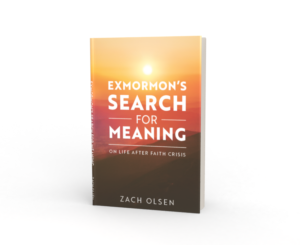The below is a chapter from ExMormon’s Search For Meaning, available to purchase on Amazon.
As a believer I enjoyed seeing the church announce its membership statistics at each general conference. Every year the numbers went up, so, the church was true. One of my first points of interest after becoming a non-believer was to understand how to refute the claim that Christianity’s unlikely triumph is proof of divine favor. Searching for books on Amazon revealed one that was asking my exact question: The Triumph of Christianity: How a Forbidden Religion Swept the World, by Bart D. Ehrman.
While Ehrman’s answer was in itself interesting (Christianty simply out-competed paganism: it wasn’t closed to women, it embedded social welfare into its doctrines, it claimed ultimate truth that foreclosed devotion to all other deities and also included proselytizing in it’s doctrine so that while the growth looks incredible, in fact it’s simply the result of an exponential curve) that wasn’t what caught my eye.
My indoctrination had always included viewing people who were not religious as also not being very moral – how could they be? They don’t believe in God! I was dumbfounded when I learned that the Romans prior to Christianity had morals. God and acting morally were not one in the same? Pagans had no concept of a God that required worshipers to acknowledge the validity of certain truths or live a life that the Gods would deem acceptable. Pagan religions were all about cultic acts: a ritualized practice like animal sacrifice that was done out of reverence to the gods. Ehrman explains, “It is not that ancient people were less ethical than people today; it is that ethics had little to do with religion. Where ethics played a role was in philosophy. Philosophers talked a lot about how people should act toward one another; as members of a family, in relationships, with friends and neighbors, as citizens of a city. Good behavior was part of being a worthwhile human being and a responsible citizen. But it was generally not a part of religious activities.”
To learn morals one need not defer to supernatural deities. Instead, philosophy! Philosophies have two components: they tell us what things in life are and aren’t worth pursuing, and they tell us how to gain the things that are worth having. The result of a particular philosophy is found between your philosophy—how you interpret things, what you think is important—and the quality of your mental and physical health.
I’d always thought philosophers were just people in universities with patches on their elbows who came up with obscure thought experiments. I’m not alone in this judgment. Donald Robertson in his book The Philosophy of Cognitive Behavioral Therapy relates that in ancient times the ideal philosopher was a veritable warrior of the mind, but in modern times, “the philosopher has become something more bookish, not a warrior, but a mere librarian of the mind.” Philosophy has always been about transforming the life of the philosopher, in a manner that resembles modern psychotherapy or self-help. As far back as Socrates, philosophy has been compared to the art of medicine for the mind or soul, what we now call psychotherapy. Philosophy isn’t some esoteric thought exercise that you need a degree to understand, it speaks to the everyday concerns of ordinary people.
I may have lost interest in the demands made by supernatural beings, but I haven’t lost an interest in self-improvement. I am very comfortable acknowledging that I am selfish, prone to overindulge, quick to judge, fixated on possessions and status, and hesitant to help other people. Given my faults, repetition of simple, even childlike lessons that I used to get at church on how to conduct myself are not only warranted but welcome. I don’t consider myself above the lessons and reminders that religion pushed, I’m just over the need to be threatened with hell or bribed by the Celestial Kingdom to comport myself in a way that is best for me. My forgetful self needs a constant diet of lessons on how to live well, no matter how many times I’ve heard them before. Philosophy provides the means to that end, no superstitions required.
I decided to become a philosopher in the ancient sense of the word. I would develop a path to morals, and potentially meaning, that didn’t rely on God, that was practical and based on my own empirical evidence. Socrates, Plato, Epictetus, Seneca, Epicurus and Marcus Aurelius would be my new teachers.






